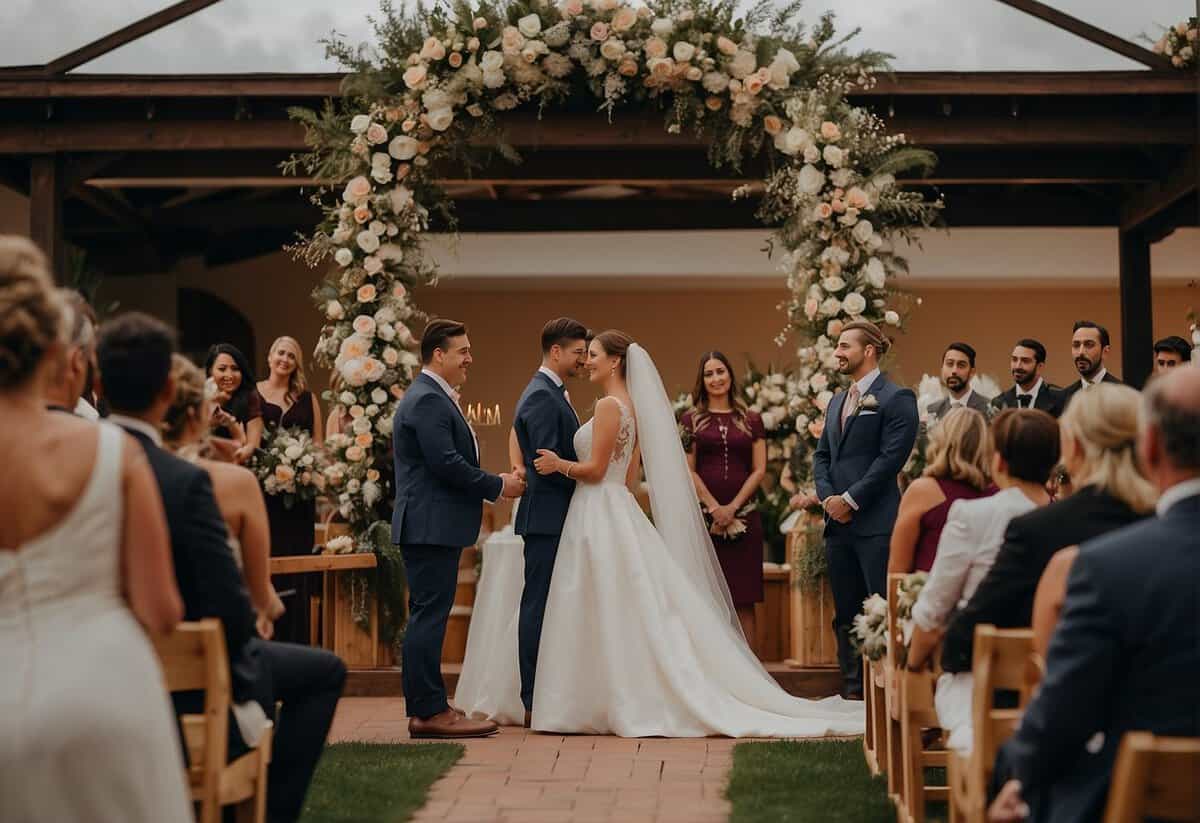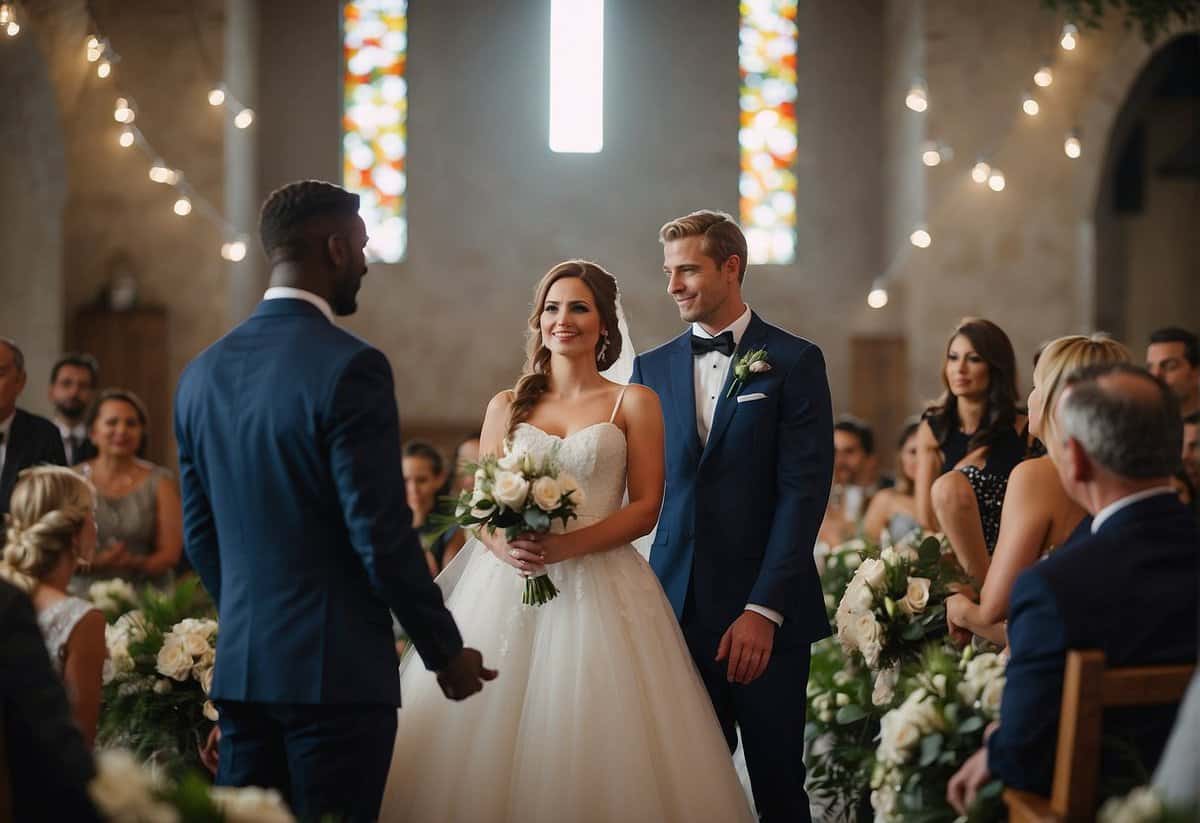What is Wedding Etiquette? Understanding the Dos and Don’ts for Your Big Day
Wedding etiquette encompasses the dos and don’ts that guide behavior surrounding nuptials, ensuring that the celebration is as smooth and enjoyable for everyone involved. It’s a fusion of tradition and consideration for others, filled with norms that show respect for the couple, their families, guests, and all the small details that culminate in the big day. Understanding wedding etiquette helps you navigate the complexities of engagement, planning, the ceremony, and everything that comes after the joyous event.

Recognizing the intricacies of pre-wedding planning can make a significant difference. From crafting the guest list to sending out invitations, there are thoughtful steps to follow to set the tone for your celebration. As for the ceremony and reception, knowing the appropriate dress codes, the timing of speeches, and the order of dances can contribute immensely to the atmosphere of love and festivity. When the wedding is over, post-wedding etiquette such as sending timely thank-you notes sustains the warmth and appreciation that the celebration is all about.
Key Takeaways
- Wedding etiquette guides respectful and enjoyable celebrations.
- Proper planning etiquette sets the tone for the event.
- Post-wedding practices maintain the connection with guests.
Pre-Wedding Planning

As you embark on the exciting journey of pre-wedding planning, it’s important to navigate the etiquette around invitations, announcements, and gift registries. These elements set the tone for your wedding and ensure your guests are informed and feel included.
Invitations and Guest List
Creating the Guest List: Begin by determining the size of your wedding and the venue’s capacity. This will help you decide how many guests you can invite. Keep in mind family expectations and the balance between friends, family, and colleagues.
- Plus-One Invitations: Extend a plus-one invitation to married, engaged, and cohabitating guests as a courtesy. For single guests, consider the closeness of your relationship before offering a plus-one.
- Invitations for Children: Decide early on if children are invited to your wedding and state it clearly on the invitation to avoid confusion.
Wedding Invitations: Aim to send out your invitations at least 8 weeks before the wedding date. Make sure to include all the vital information:
- RSVP Deadline: Typically set three to four weeks before the wedding to finalize headcount.
- Wedding Website: Include the URL where guests can find additional details and updates.
Engagement and Announcement Protocol
Announcing Your Engagement: Share your engagement news with your closest family and friends before posting on social media. This personal touch shows respect and avoids any hurt feelings.
- Timing: While there’s no set rule, many couples choose to announce their engagement soon after the proposal, allowing ample time for pre-wedding festivities.
Registry and Gifts
Setting Up Your Registry: Register for gifts early on to assist guests looking for engagement party and shower gifts. Provide a range of options across different price points to accommodate all guests.
- Registry Information: Include your registry details on your wedding website rather than in your wedding invitations. This maintains proper etiquette and still directs guests to your preferred gifts.
Remember to keep track of who gives what as you’ll need this information for sending out your thank-you notes after the wedding. Keeping these points in mind will help ensure your pre-wedding planning goes smoothly and your guests feel valued and informed.
Ceremony Considerations

When planning your wedding ceremony, it’s important to understand that the choices around attire and the delegation of roles set the stage for the event. Proper etiquette ensures that everyone involved feels respected and knows what’s expected of them.
Dress Codes and Attire
Dress codes are pivotal in setting the tone for your ceremony. If you envision a formal event, you will likely request that men don tuxedos or suits, while women should opt for evening gowns. For a more informal gathering, a nice dress or a dress shirt paired with slacks might be appropriate. Remember, explicitly stating the dress code on your invitation helps guests dress appropriately.
- Formal: Tuxedos, long gowns
- Semi-formal: Suits, cocktail dresses
- Casual: Dress shirts, summer dresses
Bear in mind the traditional request for guests to avoid wearing white to not compete with the bride’s attire. If there’s a specific color theme, you might suggest hues that complement it. It’s also considerate to think about comfort and accessibility—for example, an outdoor wedding may warrant recommending suitable footwear.
For children involved in the ceremony, such as flower girls or ring bearers, their attire typically aligns with the bridal party. It’s a sweet touch that adds to the cohesive aesthetic of your celebration.
Roles and Responsibilities
Your wedding day will be smooth when everyone understands their roles and responsibilities. Key players include bridesmaids and groomsmen, family members, and especially the parents of the bride and groom. Each has specific duties:
- Bridesmaids and groomsmen: They assist the bride and groom in the lead-up to and on the day of the wedding.
- Parents: Often providing emotional and sometimes financial support, parents might also have ceremonial roles.
- Family members: Could be involved in readings or other special parts of the ceremony.
Assign tasks clearly and early. Bridesmaids, for instance, might help with organizing bouquets or coordinating the entrance. A family member’s reading during the ceremony adds a personal touch. And remember, heartfelt thanks to your wedding party and family will go a long way after the big day.
Reception and Celebration

Wedding etiquette during the reception centers on showing respect and appreciation for your hosts while celebrating the bride and groom. Your awareness of customs and courteous behavior ensures a joyful and memorable experience for everyone involved.
Hosting and Toasting
As a host, you hold the responsibility of creating a welcoming atmosphere and ensuring the comfort of your wedding guests. This often includes providing clear instructions regarding the itinerary. Toasting is a revered wedding tradition, and if you decide to give one, prepare your speech beforehand. Keep it brief, heartfelt, and relevant to the couple’s journey.
- Do: Offer toasts that are respectful and inclusive of all guests.
- Don’t: Allow speeches to become too lengthy or off-topic, which can disrupt the flow of the reception.
Social Conduct and Interaction
Your role as a wedding guest includes engaging in polite social conduct, partaking in the festivities, and respecting the vibe the bride and groom wish to convey. Be mindful of the wedding traditions they choose to incorporate or omit, and contribute to a pleasant environment for everyone.
- Do: Congratulate the couple personally and consider bringing a gift aligned with their wedding registry or a cash gift to fit within your budget.
- Don’t: Overshadow the couple; remember, this day celebrates their union and relationship.
Remember that after the wedding day, sending thank you notes is a thoughtful way to express gratitude to the hosts, guests, and vendors for their services and contributions to the celebration.
Post-Wedding Etiquette

After the celebration ends, it’s crucial to express your gratitude to those who contributed to your special day. It’s a time to acknowledge the love, support, and gifts you received.
Gratitude and Follow-Ups
Thank You Notes: It’s your responsibility to send thank you notes to your guests within three months of the wedding. These notes should be personalized, expressing sincere thanks for specific gifts and gestures. Remember, a handwritten note is more meaningful than a digital one.
-
To the Hosts: Show your appreciation to the hosts, often your parents or in-laws, for their support and efforts in making your wedding happen. They deserve a special acknowledgment for their role in your journey.
-
To the Guests: Each guest took the time to celebrate with you, and many brought gifts. List each gift next to the guest’s name to ensure you mention it in your note, reinforcing your appreciation for their thoughtfulness.
Remember, these gestures nurture the relationships you’ll continue to cherish as a married couple. Your warmth and appreciation will strengthen the bonds you’ve formed.
Frequently Asked Questions

In navigating the intricate world of wedding etiquette, you may have several questions regarding your role, attire, financial obligations, and behavior. This section addresses the most commonly asked questions to ensure that you approach these nuptial celebrations with confidence and grace.
What are the typical responsibilities of the bride’s parents in wedding planning?
Traditionally, the bride’s parents play a significant role in the wedding planning process. They may host the engagement party and are often involved in the planning and funding of the wedding. Tasks can include selecting the wedding venue, organizing the guest list, and coordinating the ceremony logistics.
How should guests dress for a wedding?
Guests should dress according to the dress code specified on the invitation. For a formal or black-tie wedding, men typically wear tuxedos, while women opt for evening gowns. At a semi-formal or casual wedding, a suit and tie or a cocktail dress would be appropriate.
Who is traditionally responsible for covering wedding costs?
Traditionally, the bride’s family is responsible for the majority of the wedding expenses, while the groom’s family may cover specific elements such as the rehearsal dinner or honeymoon. However, many modern couples choose to share these costs or fund their weddings independently.
What is the appropriate behavior for a couple at their wedding reception?
At their wedding reception, a couple should make an effort to greet and thank their guests for attending. They should also be mindful of their interactions and display a level of decorum that honors the significance of their wedding day.
What are three key rules to remember when attending a wedding?
When attending a wedding, remember to RSVP promptly, adhere to the dress code, and avoid bringing uninvited plus-ones. It’s equally important to respect the couple’s wishes regarding photos and social media postings.
What is the proper protocol for wedding invitations and RSVPs?
Upon receiving a wedding invitation, you should respond by the RSVP date indicated. If provided, use the RSVP card to indicate your attendance or send your regrets. If you must cancel after accepting, notify the couple as soon as possible.
